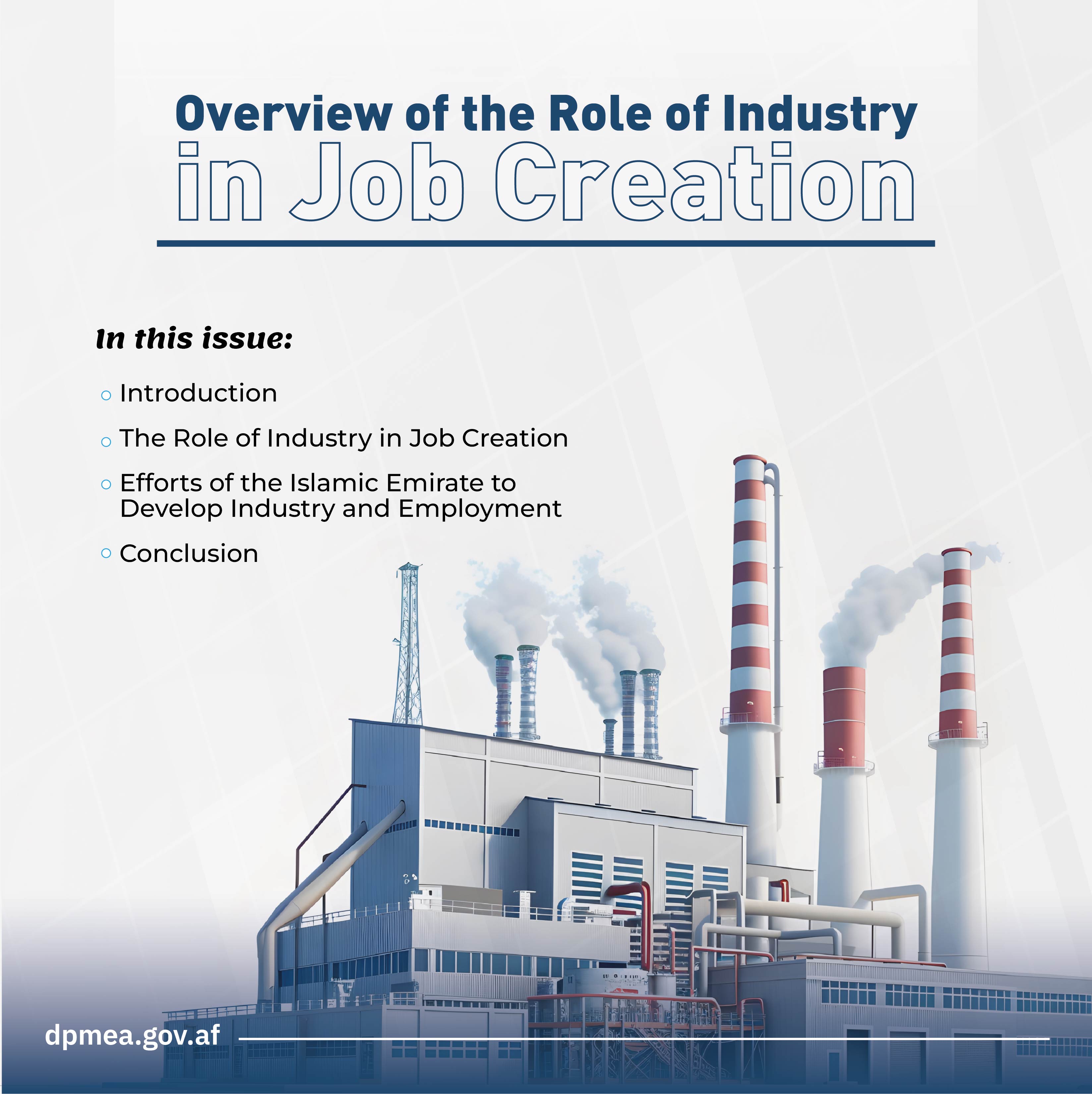Overview of the Role of Industry in Job Creation

By: Abdullah
Introduction
Years ago, humans began contemplating how to change their lives. This idea became widespread following the invention of electricity. People became curious about how to use the resources God Almighty created for the comfort of life. As a result, humans sought to change their lifestyles, transferring tasks once performed by manpower or animals to machines. Machines could complete tasks in hours that used to take humans or animals days to finish. Everything in nature exists for human benefit, and producing these tools is what we call industry.
Industry in Afghanistan has a long history, and the country has been referred to as the cradle of culture and civilization. Although Afghanistan has always had industry throughout its history, various challenges have hindered its development.
The Role of Industry in Job Creation
The rise in unemployment on a global scale has significantly affected Afghanistan. In recent years, the COVID-19 crisis and climate change have exacerbated the unemployment rate both in Afghanistan and worldwide. Climate change, the pandemic, and other factors have caused unemployment to increase. According to the International Labor Organization (ILO), the global unemployment rate rose compared to previous years and is projected to increase from 5.1% in 2023 to 5.2% in 2024.
Despite various governments coming to power over the past decades, unemployment in Afghanistan has not decreased, leading to continued migration abroad. When the Islamic Emirate of Afghanistan assumed control, the country was already struggling with unemployment alongside other issues. the Islamic Emirate they have created a secure environment for investment through nationwide security efforts, aiming to provide employment opportunities by implementing large national projects.
Industry, as a vital part of the economy, plays a key role in generating employment opportunities. Industrial development not only enhances the economy but also increases job opportunities. As production levels rise, more jobs become available for the workforce. Additionally, industrial expansion boosts the production of essential goods, contributing to trade growth and increased exports.
Efforts of the Islamic Emirate to Develop Industry and Employment
Following the end of foreign occupation, the Islamic Emirate has focused on developing the industrial sector by establishing industrial parks and offering land and facilities to investors. They have emphasized creating a safe environment for investment and encouraged both domestic and foreign investors to engage in Afghanistan's economy.
In addition to industrial development, the government aims to strengthen agriculture by improving water management and constructing dams to expand arable land. This initiative will address local food needs and increase production. With higher agricultural output, farmers’ incomes will improve, and more job opportunities will arise.
Afghanistan also possesses untapped mineral wealth that has remained largely unexplored due to war, weak governance, and administrative corruption. The Islamic Emirate has accelerated the process of mineral extraction, actively working on projects across different regions. Although facing some limitations, the government has initiated efforts to strengthen the national economy.
Infrastructure projects such as canal and dam construction, road reconstruction, and building industrial cities are among the activities currently underway. The government reports that these initiatives have created thousands of jobs directly and indirectly. Additionally, many mining operations have been handed over to local companies, boosting both the companies’ capacity and the country’s economic benefit. Using local resources also enhances self-reliance.
Conclusion
Unemployment has been a persistent challenge in Afghanistan, inherited by successive governments with no lasting solutions. The continued unemployment crisis has worsened economic conditions and driven more Afghans to migrate abroad. The Islamic Emirate must address unemployment by launching major projects that generate jobs. With job creation, the country's youth can participate in national reconstruction and development, accelerating domestic production activities.
For Afghanistan to make meaningful progress toward industrialization, strategic programs must be developed and implemented to promote agriculture, which is closely linked to industry. Agriculture supplies the raw materials required for industrial production, and focusing on both sectors simultaneously can promote self-sufficiency and create jobs.
Paying attention to Afghanistan’s industrial development can pave the way for economic growth, given the country’s young workforce, abundant natural resources, untouched mineral deposits, forests, agricultural land, and water resources. Implementing these programs will undoubtedly transform Afghanistan into a prosperous nation.